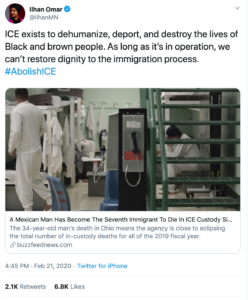By Gilbert Borrego
 César Chávez was a tireless activist whose devotion to the cause of farm workers contributed to the ongoing fight for workers’ rights today. As a first generation American who toiled as a migrant worker when he was young, he had specific insight into the racist and classist system that farm laborers were forced to endure in the mid-twentieth century. In order to escape this unjust system, he joined the United State Navy before eventually returning to his roots and beginning his journey as a labor organizer in order to address the poverty and inequalities he experienced and observed.
César Chávez was a tireless activist whose devotion to the cause of farm workers contributed to the ongoing fight for workers’ rights today. As a first generation American who toiled as a migrant worker when he was young, he had specific insight into the racist and classist system that farm laborers were forced to endure in the mid-twentieth century. In order to escape this unjust system, he joined the United State Navy before eventually returning to his roots and beginning his journey as a labor organizer in order to address the poverty and inequalities he experienced and observed.
In 1962, he and the iconic Dolores Huerta co-founded the National Farm Workers Association (NFWA). They partnered with the Agricultural Workers Organizing Committee (AWOC) to organize what turned out to be a five-year strike against California grape growers. This strike led to many workers obtaining a contract from the grape producers which addressed wages and humane working conditions for the workers. When the NFWA and the AWOC joined together to form the United Farm Workers (UFW) in 1972, Chávez had a strong, organized platform to fight for the rights of farm workers everywhere, leading nonviolent strikes, marches, boycotts, and fasting until his death in 1993.
In 1994, César Chávez posthumously received the country’s highest civilian award, the Medal of Freedom, and in 2014, President Barack Obama declared his birthday (March 31st) a federal holiday.
Books:
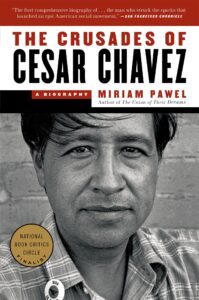 The Crusades of César Chávez: by Miriam Pawel
The Crusades of César Chávez: by Miriam Pawel
“A searching portrait of an iconic figure long shrouded in myth by a Pulitzer Prize-winning journalist and author of an acclaimed history of Chávez’s movement. César Chávez founded a labor union, launched a movement, and inspired a generation. He rose from migrant worker to national icon, becoming one of the great charismatic leaders of the 20th century. Two decades after his death, Chávez remains the most significant Latino leader in US history. Yet his life story has been told only in hagiography―until now.”
Union of Their Dreams by Miriam Pawel
“A generation of Americans came of age boycotting grapes, swept up in a movement that vanquished California’s most powerful industry and won dignity and contracts for impoverished farm workers. Four decades later, United Farm Workers leader César Chávez’s likeness graces postage stamps, and schools and streets are renamed in his honor. But the real stories behind la causa–both its historic accomplishments and tragic disintegration–have remained buried. Pulitzer-winning journalist Miriam Pawel has changed our understanding of the UFW forever, crafting a powerful, poignant account of a movement and the people who made it. A tour de force of reporting and a spellbinding narrative, The Union of Their Dreams is a major contribution to the history of labor, civil rights, and immigration in modern America.”
An Organizer’s Tale: Speeches by César Chávez
“One of the most important civil rights leaders in American history, César Chávez was a firm believer in the principles of nonviolence, and he effectively employed peaceful tactics to further his cause. Through his efforts, he helped achieve dignity, fair wages, benefits, and humane working conditions for hundreds of thousands of farm workers. This extensive collection of Chávez’s speeches and writings chronicles his progression and development as a leader, and includes previously unpublished material. From speeches to spread the word of the Delano Grape Strike to testimony before the House of Representatives about the hazards of pesticides, Chávez communicated in clear, direct language and motivated people everywhere with an unflagging commitment to his ideals.”
The Fight in the Fields: César Chávez and the Farmworkers Movement by Susan Ferriss and Ricardo Sandoval.
“A “vivid, well-documented account of the farm workers movement” (Philadelphia Inquirer) and its prime mover, César Chávez.”
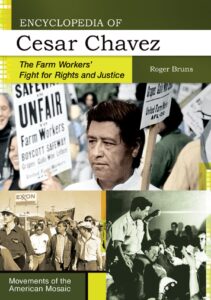 Encyclopedia of César Chávez: The Farm Workers’ Fight for Rights and Justice by Roger Bruns
Encyclopedia of César Chávez: The Farm Workers’ Fight for Rights and Justice by Roger Bruns
“This book is a unique, single-volume treatment offering original source material on the life, accomplishments, disappointments, and lasting legacy of one of American history’s most celebrated social reformers―César Chávez.”
Comics and Graphic Novels:
Harvesting Hope: The Story of César Chávez by Kathleen Krull and Yuyi Morales
“César Chávez is known as one of America’s greatest civil rights leaders. When he led a 340-mile peaceful protest march through California, he ignited a cause and improved the lives of thousands of migrant farmworkers. But César wasn’t always a leader. As a boy, he was shy and teased at school. His family slaved in the fields for barely enough money to survive. César knew things had to change, and he thought that–maybe–he could help change them. So he took charge. He spoke up. And an entire country listened.”
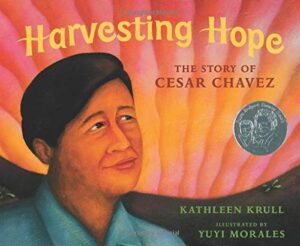
A Picture Book of César Chávez by David A. Adler, Michael S. Adler, and Marie Olofsdotter
“César Chávez dedicated his life to helping American farmworkers. As a child growing up in California during the Great Depression, he picked produce with his family. César saw firsthand how unfairly workers were treated. As an adult, he organized farmworkers into unions and argued for better pay and fair working conditions. He was jailed for his efforts, but he never stopped urging people to stand up for their rights. Young readers will be inspired by the fascinating life story of this champion of social justice.”
Who was César Chávez? by Dana Meachen Rau and Ted Hammond
“A biography telling the life of labor leader César Chávez and the boycotts that he led to gain fair working conditions for farmworkers. Written in graphic-novel format.”
Video:
The Fight in the Fields: César Chávez and the Farmworkers’ Struggle by Ray Telles and Rick Tejada-Flores
“The story of César Chávez, the charismatic founder of the United Farmworkers Union and the movement that he inspired – a movement that touched the hearts of millions of Americans with the grape and lettuce boycotts, a non-violent movement that confronted conservative politicians like Ronald Reagan and the powerful Teamsters Union.”
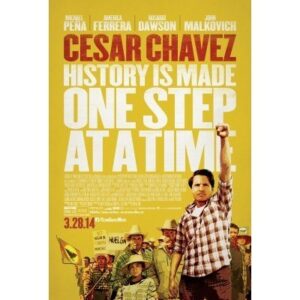 César Chávez directed by Diego Luna
César Chávez directed by Diego Luna
“The story of the famed civil rights leader and labor organizer torn between his duties as a husband and father and his commitment to securing a living wage for farm workers. Chávez embraced non-violence as he battled greed and prejudice in his struggle to bring dignity to people. He inspired millions of Americans who never worked on a farm to fight for social justice. His triumphant journey is a remarkable testament to the power of one individual’s ability to change the world.”
